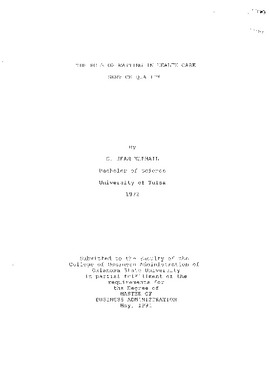| dc.contributor.advisor | Manzer, Lee | |
| dc.contributor.author | McPhail, C. Jean | |
| dc.date.accessioned | 2015-09-01T16:06:53Z | |
| dc.date.available | 2015-09-01T16:06:53Z | |
| dc.date.issued | 1991-05 | |
| dc.identifier.uri | https://hdl.handle.net/11244/17333 | |
| dc.description.abstract | Scope and Method of Study: The study was a randomized field experiment which examined the effects of uncertain waits versus certain waits in preprocess delays on the perceived service quality of emergency room patients. Adult patients with minor conditions were chosen to participate. Patients were in one of two groups: those who were given no information about the expected wait before examination by a doctor or those who were told the wait would be about 35 minutes, the median wait for the categories selected. 399 surveys were mailed; 171 were returned. | |
| dc.description.abstract | Findings and Conclusions: The study's hypothesis that "consumers will perceive higher quality of service when their expectations about a delay are established accurately at the outset" was not confirmed. Results did indicate, however, that subjects who thought they had been given a time, were more satisfied, regardless of whether or not they were actually given an expected time. | |
| dc.format | application/pdf | |
| dc.language | en_US | |
| dc.rights | Copyright is held by the author who has granted the Oklahoma State University Library the non-exclusive right to share this material in its institutional repository. Contact Digital Library Services at lib-dls@okstate.edu or 405-744-9161 for the permission policy on the use, reproduction or distribution of this material. | |
| dc.title | Role of waiting in health care service quality | |
| osu.filename | Thesis-1991R-M172r.pdf | |
| osu.accesstype | Open Access | |
| dc.type.genre | Master's Report | |
| dc.type.material | Text | |
| thesis.degree.discipline | Business Administration | |
| thesis.degree.grantor | Oklahoma State University | |
